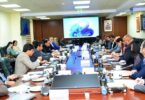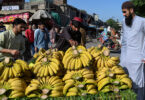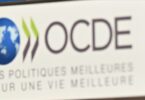Kristalina Georgieva:
I am so thrilled that the Security Council has decided on International Women’s Day to concentrate on the role of women in peace and security.
Bruce Edwards:
Welcome to this podcast produced by the International Monetary Fund. Today, IMF Managing Director, Kristalina Georgieva joins a special UN Security Council meeting on women’s economic inclusion as a key to building peace.
Kristalina Georgieva:
Women and girls, are themselves, powerful agents of change. They help societies transition from fragility to stability.
Kristalina Georgieva:
What we do today matters to hundreds of millions of women living in conflict and fragility. It is an opportune time to reflect on the strength and power of women in the face of war and distraction. Tragically, in far too many places, this strength is being relentlessly tested. My heart goes to all the women bracing the horror of war. Protecting their children, caring for the wounded, sacrificing for their countries, their communities, their families.
Kristalina Georgieva:
Today, this is the fate of our sisters in Ukraine. We admire your courage. We share your pain. We stand with you. We support you.
Kristalina Georgieva:
We know that women bear disproportionately the devastation of wars. And yet we also know women are the best hope for peace. In the words of Zainab Salbi, “Like life, peace begins with
We know that women bear disproportionately the devastation of wars. And yet we also know women are the best hope for peace. In the words of Zainab Salbi, “Like life, peace begins with women.” We are the first to forge lines of alliance and collaboration across conflict divides.
Today, I would like to make three points. First, crisis, be they conflicts, or pandemics, or more traditional economic and financial crisis, threatened to set back years of progress in gender equality. Therefore, slow down progress in development. In the pandemic, globally, twice as many women as men lost their jobs. And let’s remember, women are 20% below men in labor market participation to begin with.
Kristalina Georgieva:
We also have seen tremendous earning losses. We calculate that, over lifetime of the generations affected by the pandemic, $17 trillion will be lost because of this lack of educational attainment. More dramatic is the fate of girls. We know that 20 million girls in developing countries may never return to school. And that means they’re excluded from life’s opportunities forever, for the duration of their lives. We also have seen during the pandemic, the ugly head of gender based violence being up. And of course we know that this leads to serious socioeconomic consequences. We have calculated this consequences.
Kristalina Georgieva:
But I also want to about the positive side. As dramatic as these effects are, we need to remember that overcoming them can be a massive injection of prosperity for countries. Empowering women, reducing inequality in fragile or conflict situations in particular, can have powerful economic benefits. If subSaharan African countries reduced gender based violence, closer to world average, they could see long term GDP gains of around 30%… wellbeing for everyone.
Kristalina Georgieva:
And that brings me to my second point. Gender equality is critical for growth, resilience, socioeconomic stability. It matters tremendously when women and girls can reach their full potential. They do better, their families do better, their countries do better, for the benefit of everyone. Improving gender equality can raise economic growth, quite significantly. Strengthen the resilience of families, communities, and countries. Enhance financial stability, and reduce income inequality.
Kristalina Georgieva:
We know societies with more gender equality tend to be more resistant to violence and conflict. And the equal participation of women in socioeconomic life is essential to prevent conflict and help transition out of fragility. When women participate in peace negotiations in state building processes, the chances for building resilience for enduring peace, for inclusive and prosperous societies, significantly improves. And the Security Council has such an important role to promote women inclusion in peace building.
Kristalina Georgieva:
Yet too often, women remain underrepresented and excluded from decision making processes. To change that we need all hands on deck. We need international organizations, we need governments, we need private sector, so we can see a chance to reduce fragility. And by closing gender gaps to improve prospects for development, which takes me to my third point.
Kristalina Georgieva:
And it is we all have responsibility to bear and that applies to my institution, the international monetary fund. I want to report to you that we are relentlessly focusing on helping our members design and implement macroeconomic and financial policies, to ensure greater resilience and growth. We are particularly zeroing in on social spending. It is an efficient and effective way to allow better education for boys and girls, better healthcare, better social protection. And as a result, stronger societies.
Kristalina Georgieva:
result, stronger societies.
Kristalina Georgieva:
We believe that a country tailored approach is vital. So in our new strategy on gender, that we are going to bring to our board this spring, as well as in our fragile and conflict effective state’s strategy, we explicitly emphasize the role of gender equality. We see country engagement strategies that are based on contributions from society. Where the voice of women is heard to be a major factor for us to help our members deal with drivers of fragility, such as gender equality, climate change, forced displacement, or food insecurity.
Kristalina Georgieva:
We are very keen to work with our partners, humanitarian development, peace and security actors. 25% of our members are conflict of fragility affected states. We need to work with you, with everyone, to be successful in these countries. Let me conclude with this thought. Women and girls are themselves powerful agents of change. They help societies transition from fragility to stability. They are a foundation for a better future for all. And we saw that in these processes from Northern Ireland to Columbia. And in places like Liberia, where a movement of women help bring an end to the civil war. So to all the women and girls, believe in yourself. Dare to reach your full potential. You have the power to forge a brighter future for our societies, for our economies, for our world. All the power in the hands of women means a prosperous world for all.
Bruce Edwards:
That was IMF Managing Director, Kristalina Georgieva, speaking at a special UN Security Council meeting on women’s economic inclusion as a key to building peace, to celebrate International Women’s Day. Look for more IMF podcasts on Apple Podcasts or wherever you listen, and leave us a review. It’ll help other people discover IMF Podcasts. You can also follow us on Twitter at IMF underscore podcast. I’m Bruce Edwards. Thanks for listening.






